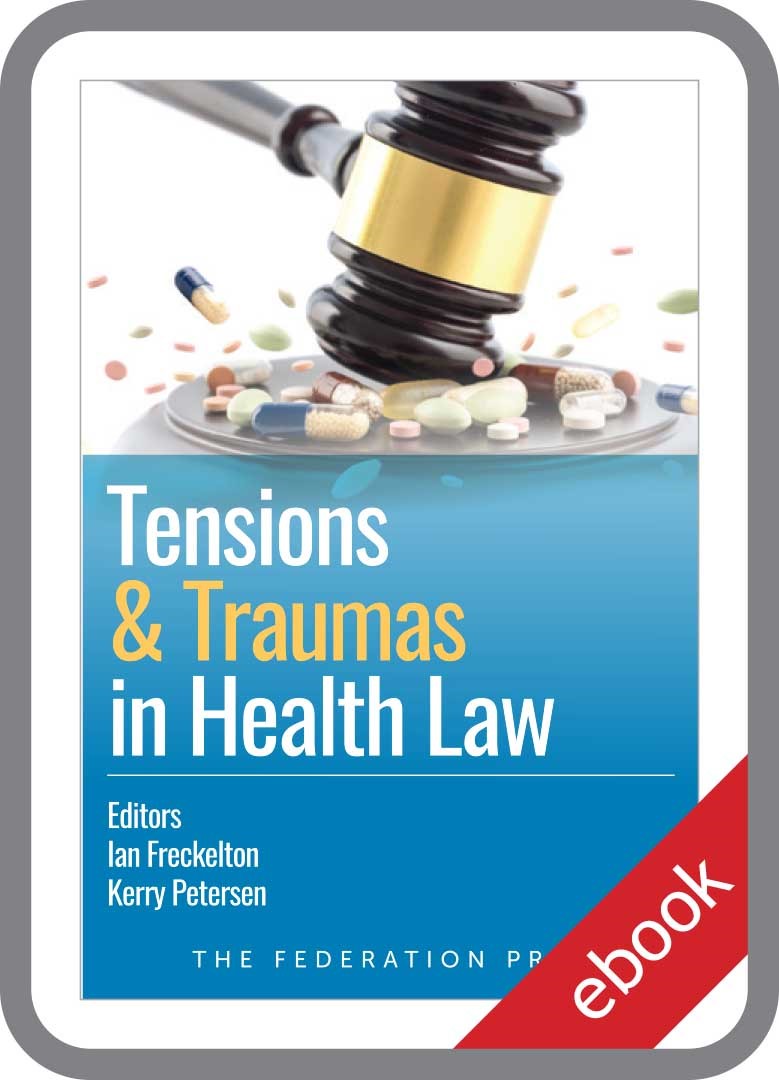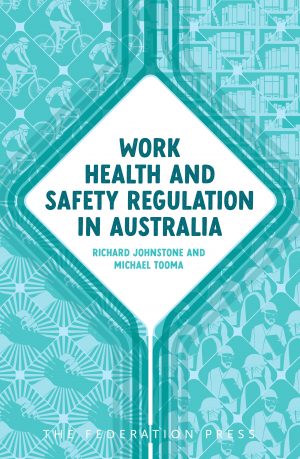This book builds upon the successful Controversies in Health Law (1999) and Disputes and Dilemmas in Health Law (2006). Under the same editorship, it is substantially larger (37 chapters instead of 18 and 30 respectively) and correspondingly more comprehensive. It retains the lively analysis and the focus on controversial and cutting-edge problems in health law.
The chapters are broken up into 10 parts covering Human Rights Issues; Ethico-Legal Issues; Global Health Issues; Consent Issues; Privacy and Confidentiality Issues; Reproductive Technology Issues; Health Research Issues; Death and Dying Issues; Legal Liability Issues; and Reform and Regulatory Issues.
They consider issues raised by new technologies, changing legislation and altering community expectations; by new regulatory processes for medicine and all of the health professions; by important changes to civil liability for medical negligence; by likely changes to the legality of assisted dying/euthanasia law; by biobanking and embryo research.
Tensions and Traumas in Health Law covers questions on property in human tissue and on the ethical and legal aspects of the genetics revolution; provides a modern take on ‘old’ issues such as reproductive law and on refusal of treatment for seriously ill minors; takes account of changes relating to the delivery of health services such as global and public health law policies, and by health tourism; reviews the dilemmas posed by regulation of unregistered health professions, research misconduct and the forensic role of health practitioners; and discusses how difficult cases in relation to informed consent, lost chance litigation, mental harm claims and wrongful birth cases have pushed compensability to its edges.
Foreword by Sheila AM McLean
Acknowledgments
About the Contributors
Table of Cases
Table of Statutes
Introduction
Ian Freckelton and Kerry Petersen
PART A: HUMAN RIGHTS ISSUES
1. Health Law and Human Rights: Towards Equality in the Human Right to Health
Penelope Weller
2. Aged Care and Liberty Deprivation
Kate Diesfeld
3. Mental Health Law
Ian Freckelton and Warren Brookbanks
4. Accountability through Litigation: Health Care Justice and Australia’s Immigration Detention Program
Paula O’Brien
PART B: ETHICO-LEGAL ISSUES
5. Ethico-Legal Dilemmas in Clinical Service Delivery: Continuity, Recognition and Relationships in Clinical Service Delivery
Grant Gillett
6. Finite Resources and Clinical Care: Rationing
Jonathan Herring
PART C: GLOBAL HEALTH ISSUES
7. Health Care and International Trade and Investment
Thomas Faunce
8. Global Health
Belinda Bennett and Belinda Reeve
9. Public Health Law
Sonia Allan
10. Transnational Health Care: Regulating the Line Between Hype and Hope in Health Tourism
Ian Freckelton
PART D: CONSENT ISSUES
11. Cracks in the Lintel of Consent
Cameron Stewart
12. Refusal of Potentially Life-saving Treatment for Minors
Ian Freckelton and Simon McGregor
13. End of Life Decision-making for (Extremely) Premature or Critically Impaired Infants
Neera Bhatia
PART E: PRIVACY AND CONFIDENTIALITY ISSUES
14. Health Privacy and Confidentiality
Danuta Mendelson and Gabrielle Wolf
15. Genetic Privacy
Margaret Otlowski and Lisa Eckstein
PART F: REPRODUCTIVE TECHNOLOGY ISSUES
16. Assisted Reproduction: Emerging Technologies, Ethics, Regulation and Practice
Sonia Allan
17. Non-Medical Sex Selection: Sliding Down the Slippery Slope?
Michelle Taylor-Sands
18. Surrogacy
Ronli Sifris
PART G: HEALTH RESEARCH ISSUES
19. Commercialisation of Genomic Research: The Issue of Public Trust
Christine Critchley and Dianne Nicol
20. Property in Human Biomaterials
Imogen Goold
21. Human Embryos, Genome Editing and Future Directions
Tess Whitton, Dianne Nicol and Don Chalmers
22. Gene Patents
Dianne Nicol
23. Trends and Challenges in Biobanking
Jane Kaye, Jessica Bell, Megan Prictor and Megan Munsie
24. Research Fraud by Health Practitioners and the Criminal Law
Ian Freckelton and Marilyn McMahon
PART H: DEATH AND DYING ISSUES
25. Withholding and Withdrawing Potentially Life-Sustaining Treatment: Who Should Decide?
Ben White, Lindy Willmott, Eliana Close and Jocelyn Downie
26. Assisted Dying in Australia: A Values-based Model for Reform
Lindy Willmott and Ben White
27. Assisted Dying: Learning from the International Experience
Ian Freckelton
28. Organ Donation
Anne-Maree Farrell
29. Families in Conflict over their Dead
Rosalind Croucher
30. Death Investigation and the Role of the Coroner
Ian Freckelton and David Ranson
PART I: LEGAL LIABILITY ISSUES
31. Medical Practitioner Liability in Negligence
John Devereux
32. Complementary Health Law
Jon Wardle
33. The Forensic Role of Health Practitioners
Ian Freckelton
PART J: REFORM AND REGULATORY ISSUES
34. Health Workforce Conflicts
Robyn Fairhall, Debra Griffiths and Kim Forrester
35. Abortion Laws: Criminalisation and Decriminalisation
Kerry Petersen
36. Complaint Resolution, Quality Improvement and Public Protection: The Diverse Roles of Australasian Health Complaints Entities
Ron Paterson and Joanna Manning
37. Regulation of Health Practitioners
Ian Freckelton and Belinda Bennett
This volume valuably contributes to the scholarship in the area of health law. Its value stems not only from the merit of the individual papers but also from their accumulated scope and depth. The breadth and nature of the topics this collection amasses will extend its interest to a broad range of readers. Its engagement with questions of ethical, social, legal, technological, practical and theoretical significance make it an attractive resource for patients, health care professionals, policy-makers and medical and legal practitioners alike.
Larissa Welmans, Australian Law Journal, 2019, 93
One of the joys and highlights of contemporary Australian general practice is the encouragement to explore a range of healthcare issues beyond the narrowest boundaries of our specialist discipline. One such area is the evolving discipline of health law, where the clinical domain that we know so well interacts with the legal and governance structures of the courts and lawmakers, and the ethical positions of society at large.
It was from this position that I sat down to read this rather lengthy tome. Initially, I was somewhat apprehensive, concerned that the text and extensive footnotes and references would position the book more as a legal training textbook than a text for a wider audience. However, my fears were quickly abated. The text is written in an engaging style and does not presuppose that the reader is imbued with an extensive knowledge of the law and legal procedures. I particularly enjoyed the unanswered questions posed by the writers on notable controversial topics. The editors’ goal was to be ‘comprehensive [with a] lively analysis and the focus on controversial and cutting-edge problems in health law’. In my opinion, the book meets this objective with apparent ease.
There is an extensive range of topics covered in 37 chapters across 10 main topic areas, which are appropriately indexed. This gives readers the option to parachute in and read about their areas of interest rather than simply reading from cover to cover. Areas addressed include privacy and confidentiality, death and dying, and legal liability issues.
In summary, I found this an interesting and thought-provoking book that extends across the boundaries of general practitioners’ daily work into areas of contemporary Australian health issues that affect the ethical and professional lives of all our colleagues.
Stephen A Margolis OAM, Australian Journal of General Practice, July 2018
Human Rights, ethics, global health, consent, privacy and confidentiality, reproductive technologies, health research, death and dying, legal liability and reform and regulation – these 10 issues are each covered by multiple chapters in the new book …
The book provides a strong collection of thoughtful discussions on a broad range of current issues. While of particular value to undergraduate and postgraduate health law teachers and students in Australia, Freckelton and Petersen clearly intended this book for a wide audience. The issues are by no means local issues and some chapters are relevant to practising lawyers and health professionals. Adopting a quote attributed to Abraham Lincoln, “people who like this sort of thing will find this the sort of thing they like”.
Bill Madden, Journal of Law and Medicine, July 2018
This is an eminently readable book with golden nuggets for readers and students. For example, apart from lawyers in the travel insurance sector, who knew that “health tourism” for stem cell treatment, reproductive services and the more notorious travel for cosmetic surgery was worth an estimated $US4 billion globally in 2016? These traumas and their regulation are comprehensively considered in Ian Freckelton’s “Transnational Health Care: Regulating the Line Between Hype and Hope in Health Care”.
Other treasures in this very wide-ranging and comprehensive anthology include Professor Cameron Stewart’s careful critique of the tensions between the categorisation of medical treatment as therapeutic and non-therapeutic by the High Court in Re Marion in “Cracks in the Lintel of Consent”. He is also critical of the misunderstandings arising from the widespread use of the term “informed consent”.
This text should be of great assistance to lawyers who work in health law, both at state and federal levels – the tensions between different but similar laws across the states can lead to difficulties in interpretation and application.
But it is also for a wider audience of lawyers. The articles on reproductive technology are very useful for family lawyers who have to grapple with disputes regarding children born through the use of reproductive technology and questions whether or not sperm, ova or embryos can or should ever be “property of the marriage”.
Tensions and Traumas in Health Law is a remarkable collection of articles about critical issues in law and medicine, from the liberty of elderly people in residential care to end of life decision making to food regulation to rationing in the health care sector.
Deborah Foy, InPrint, Law Institute Journal Victoria, June 2018
Academic texts on medical law have in the past been commonly associated with issues to do with malpractice and negligence while referencing legalities such as the Bolam Test or issues concerning the maxim res ipsa loquitur.
Tensions and Traumas in Health Law edited by Ian Freckelton and Kerry Petersen, deals with that as well as more specific ethical issues corresponding to biobanking, assisted dying and euthanasia laws to name a few. It is a collection of 37 essays written by high-profile legal and medical practitioners and widely published senior academics – dealing with controversial health law policies while attempting to take matters concerning lost chance litigation and informed consent to their legal endgame. The book is surprisingly easy to navigate given its size – divided by topics (Part A to J) and relevant associated chapters.
Topic examples include the advancement in technology – raising the question of privacy and confidentiality as demonstrated in chapter 14, by Danuta Mendelson and Gabrielle Wolf – whereby the therapeutic relationship between patient and health practitioner has been challenged by encroaching third parties and government bodies.
In the wake of Victoria‘s Voluntary Assisted Dying Bill, chapter 26; authors Lindy Willmott and Ben White become more prescient as they wrestle with proposed changes and comparisons with other international jurisdictions. Cameron Stewart writes on consent in chapter 11, titled ‘Cracks in the Lintel of Consent’, presenting the dualism between negative and positive rights and the seminal case of Rogers v Whitaker about the duty to inform and how it stacks up today.
Tensions and Traumas in Health Law is a comprehensive and informative text, covering a wide range of issues involving medicine and law. The book provides an intellectual/principled basis on how to seek the best outcomes in areas of ‘tension and trauma’ in matters of health and law.
This book is recommended for anaesthetists who are currently working in teaching hospitals or are in the midst of writing a thesis or journal article based upon the relevant topics in this book. It is a good resource to start off with – depending on which areas you may choose to pursue.
Chesney O’Donnell, Australian Anaesthetist, March 2018
Reviews of previous edition:
A great reference book for anyone interested in health law in Australia.
Belinda Bennett, Director, Centre for Health Governance, Law and Ethics, University of Sydney, Australia
This comprehensive text covers wide ranging issues involving medicine and law. … The section of greatest interest to practicing opthalmologists and surgeons will be section 8, Litigation and Liability. … It provides an excellent summary of the current medical negliegence law. … This book is an excellent overall review of most of the issues in health law. It would be of interest to anyone with a particular interest in medico-legal matters.
Dr Michael Delaney, RANZCO News, September 2006
This scholarly text provides state-of-the-art discussion over a great range of health law. The subject matter is always fascinating and contemporary. Some chapters have excellent tabular summaries or appendices, particularly in relation to the differences between various jurisdictions, and there is a comprehensive bibliography and index.
Law Society Journal, Law Society of New South Wales, June 2007
The book’s 36 contributors include high profile legal and medical practitioners and widely published senior academics. … their essays are analytic, informative, challenging and at times provocative.… the book’s emphasis tends to be on the legal aspects of health dilemmas. There are discussions on liability and medical negligence, inadequate provision of health services, the accountability of health practitioners for their conduct, ramifications of public health harms, civil claims etc. The legal minefield in health law is also very evident when discussing such issues as reproductive technology and aspects of the fast-moving area of genetics. Nevertheless, that there is a strong moral and ethical side to health law is also evident, particularly in the sections dealing with human rights, and in discussions on both beginning and end-of-life issues.… It is well written and well referenced and it is also amazingly easy to read, considering the overall complexity of the issues and the sheer size of the book. The wide range of topics discussed and the general organisation of the book makes it both interesting reading and a good reference. It would be valuable for both legal and medical practitioners, and also a useful resource for students of medicine, law and many other related subjects.
Australian Law Librarian, 2007







